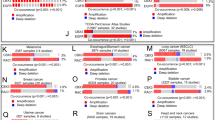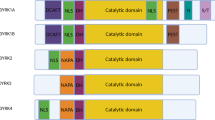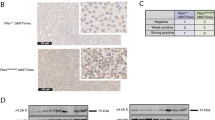Abstract
DNA amplification on chromosome 20q13 is commonly detected in breast cancer and correlates with poor prognosis. Definitive critical target genes on this amplicon have however, not yet been identified. We describe in this paper isolation of a novel gene named BTAK, encoding a putative member of protein serine/threonine kinase family localized on chromosome 20q13 that is amplified and overexpressed in breast tumor cell lines. BTAK maps close to the critical region of amplification defined earlier on this amplicon. Deduced amino acid sequence shows conservation of all the subdomains predicted in protein kinase super family. Translated BTAK peptide shows significant homology with previously cloned protein serine/threonine kinase encoding genes Ip11 from S cerevisae and aurora from Drosophila, both shown to be functionally involved in normal chromosome segregation process. Our findings suggest that amplification and overexpression of BTAK may be playing a critical role in oncogenic transformation of breast tumor cells.
This is a preview of subscription content, access via your institution
Access options
Subscribe to this journal
Receive 50 print issues and online access
$259.00 per year
only $5.18 per issue
Buy this article
- Purchase on Springer Link
- Instant access to full article PDF
Prices may be subject to local taxes which are calculated during checkout
Similar content being viewed by others
Author information
Authors and Affiliations
Rights and permissions
About this article
Cite this article
Sen, S., Zhou, H. & White, R. A putative serine/threonine kinase encoding gene BTAK on chromosome 20q13 is amplified and overexpressed in human breast cancer cell lines. Oncogene 14, 2195–2200 (1997). https://doi.org/10.1038/sj.onc.1201065
Received:
Revised:
Accepted:
Issue Date:
DOI: https://doi.org/10.1038/sj.onc.1201065
Keywords
This article is cited by
-
Safety, tolerability, and pharmacokinetics of Aurora kinase B inhibitor AZD2811: a phase 1 dose-finding study in patients with advanced solid tumours
British Journal of Cancer (2023)
-
Integrative network analysis of early-stage lung adenocarcinoma identifies aurora kinase inhibition as interceptor of invasion and progression
Nature Communications (2022)
-
Identification of key genes in oral squamous cell carcinoma by integrated bioinformatics analysis
Biologia (2022)
-
A first-in-human phase 1 and pharmacological study of TAS-119, a novel selective Aurora A kinase inhibitor in patients with advanced solid tumours
British Journal of Cancer (2021)
-
Nuclear localisation of Aurora-A: its regulation and significance for Aurora-A functions in cancer
Oncogene (2021)



